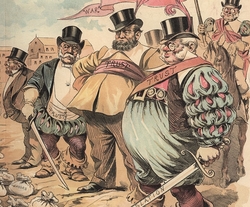A business backlash?
 By Phil Mattera, Dirt Diggers Digest
By Phil Mattera, Dirt Diggers DigestBy all rights, the laissez-faire crowd should be silent these days. Recent months have been marked by one example after another of the perils of deregulation and the folly of trusting large corporations to do the right thing. From Toyota to Goldman Sachs to Massey Energy to BP, 2010 has been the year of big business irresponsibility.
As in 2002 (after the accounting scandals involving Enron, WorldCom et al.) and 2008 (the meltdown of Wall Street), we're now at one of those moments, following an outbreak of corporate misconduct, in which public sentiment about business is up for grabs, as is public policy.
The business camp is already working hard to regain support, in ways ranging from BP's seemingly benign vow to "make things right" to Rep. Joe Barton's shameless "shakedown" outburst designed to turn the Obama Administration into the villain. Here are some other signs that corporations and their defenders are already going back on the offensive:
- A federal judge with personal investments in the petroleum industry struck down the Obama Administration's moratorium on deepwater drilling, despite evidence brought to light by Congressional investigators that the practice is much more dangerous than we had been led to believe and none of the oil giants have adequate accident response plans. The challenge to the moratorium had been brought by smaller oil service firms, but the judge's decision was hailed by majors such as Chevron and Royal Dutch Shell.
- Massey Energy, apparently hoping for a like-minded judge, has filed suit against the federal Mine Safety and Health Administration in a brazen effort to pin the blame on regulators for the April explosion at the Upper Big Branch mine in West Virginia that killed 29 workers.
- Verizon Communications CEO Ivan Seidenberg, the current head of the Business Roundtable, recently gave a speech in which he challenged regulatory initiatives in the telecom and financial sectors, criticized efforts to limit tax avoidance by multinational companies, and declared: "It's time for us all to raise our game and embrace the power of the private sector that will create real value and real growth for our country."
If business advocates are emboldened to speak out so soon, that suggests that corporations have not been reprimanded adequately for their misconduct. The criticism expressed by the Obama Administration and Congressional Democrats has had a ritualistic quality about it -- a Kabuki dance of disapproval that may not result in any real change.
Even the $20 billion BP escrow fund feels inadequate, given the fact that there is no end in sight to the disaster. Although BP's shareholders are agonizing over the suspension of the dividend payment, the company itself does not seem very put out by the creation of the fund, especially since it is being allowed to spread out the cost over several years.
The ability of BP to buy its way out of the crisis contributes to the sense that large corporations can do the most outrageous things and emerge relatively unscathed. It is unlikely that the forthcoming criminal case against the company will cause much more discomfort. The company has already been through that process with previous disasters involving oil spills in Alaska and a deadly refinery explosion in Texas. It paid the resulting penalties with no problem, and the fact that it was put on probation has had little practical effect.
What's needed is a more dramatic response to corporate negligence. It might be the arrest of a top executive or an announcement that the federal government will no longer do business with companies with serious regulatory violations or an antitrust initiative to try to break up large firms which think that their size somehow makes them above the law. Only then might corporations think twice about lashing back and returning to business as usual.
